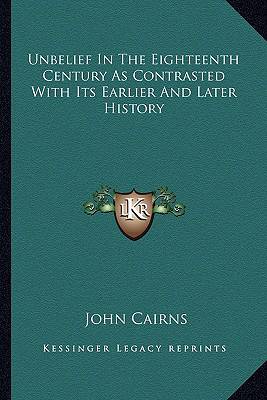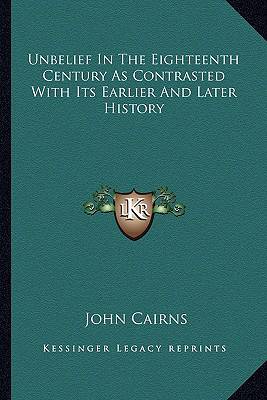
- Retrait gratuit dans votre magasin Club
- 7.000.000 titres dans notre catalogue
- Payer en toute sécurité
- Toujours un magasin près de chez vous
- Retrait gratuit dans votre magasin Club
- 7.000.000 titres dans notre catalogue
- Payer en toute sécurité
- Toujours un magasin près de chez vous
Unbelief In The Eighteenth Century As Contrasted With Its Earlier And Later History
John Cairns
Livre broché | Anglais
37,95 €
+ 75 points
Format
Description
Unbelief in the Eighteenth Century as Contrasted with Its Earlier and Later History is a comprehensive study of the phenomenon of unbelief during the 18th century, written by John Cairns. The book explores the religious and philosophical ideas that shaped the intellectual landscape of the time, and how they contributed to the rise of skepticism and disbelief.Cairns examines the historical context of unbelief, tracing its roots in the Renaissance and Reformation periods, and its evolution into the Enlightenment. He discusses the key figures and ideas that shaped the intellectual climate of the 18th century, including Voltaire, Hume, and Rousseau, and their impact on the development of modern thought.The book also explores the social and cultural factors that contributed to the rise of unbelief during this period, such as the growth of scientific knowledge, the decline of traditional religious institutions, and the emergence of new forms of political and social organization.Throughout the book, Cairns contrasts the attitudes towards unbelief in the 18th century with those of earlier and later periods, highlighting the unique challenges and opportunities that characterized this particular era.Overall, Unbelief in the Eighteenth Century as Contrasted with Its Earlier and Later History provides a comprehensive and insightful analysis of a critical period in the history of Western thought, and sheds light on the ongoing debate over the role of religion and reason in modern society.Being The Cunningham Lectures For 1880. Cairns (1818-1892) Was A Scottish Presbyterian Clergyman With A Very Extensive Knowledge Of Unbelief And The Short Title Doesn't Do Justice To The Scope And Breadth Of This Scholarly Little Tome, Which Is Well Footnoted But Unfortunately Lacks An Index. It Covers English Deism, The Encyclopedists In France, Rationalism In Germany And Strauss, Renan And J. S. Mill In The 19th Century And Reads As One Rather Sympathetic With Unbelief And Freethought. This Is Not A Religious Polemic And Was Certainly Noticed By Gordon Stein In His God Pro And Con Bibliography Of Atheism.This scarce antiquarian book is a facsimile reprint of the old original and may contain some imperfections such as library marks and notations. Because we believe this work is culturally important, we have made it available as part of our commitment for protecting, preserving, and promoting the world's literature in affordable, high quality, modern editions, that are true to their original work.
Spécifications
Parties prenantes
- Auteur(s) :
- Editeur:
Contenu
- Nombre de pages :
- 220
- Langue:
- Anglais
Caractéristiques
- EAN:
- 9781162973487
- Date de parution :
- 10-09-10
- Format:
- Livre broché
- Format numérique:
- Trade paperback (VS)
- Dimensions :
- 152 mm x 229 mm
- Poids :
- 299 g







